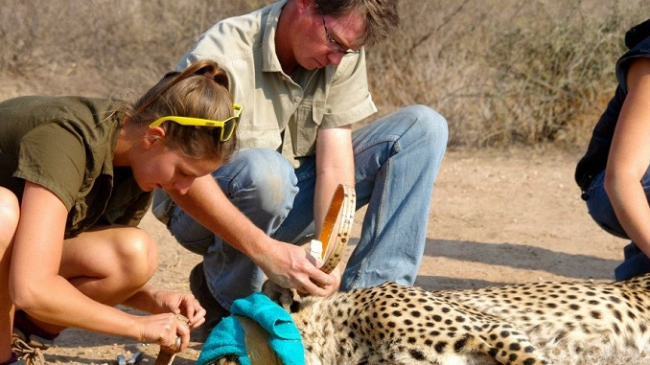Africa is renowned for its rich biodiversity and stunning array of wildlife. The continent is home to a vast diversity of species, many unique to the African continent. From the majestic elephants and fierce lions to the elusive leopards and graceful giraffes, African wildlife holds a special place in the hearts of nature enthusiasts and conservationists around the world.
Volunteer Programs Africa Wildlife conservation involves individuals dedicating their time and efforts to support initiatives that protect and preserve the continent’s natural habitats and species.
This blog post aims to shed light on the significance of Volunteer Programs Africa Wildlife and how individuals can get involved through volunteer programs.

Understanding African Wildlife Conservation
Africa boasts an astonishingly diverse range of wildlife, including the iconic “Big Five” (lion, elephant, buffalo, leopard, and rhinoceros) and countless other species. The continent is home to various habitats, from the African savannas and rainforests to deserts and coastal areas, each nurturing distinct flora and fauna. This incredible biodiversity is a vital component of the earth’s ecological balance.
Critical Need for Conservation Efforts
Despite its natural beauty and abundance of wildlife, African ecosystems face significant threats. Major challenges include habitat loss due to human activities, poaching, climate change, and human-wildlife conflict.
Conservation efforts are critical to safeguarding these delicate ecosystems and ensuring the survival of countless species for future generations. We can mitigate these threats through well-managed conservation initiatives and help African wildlife thrive.
7 Volunteer Programs Africa Wildlife
Wildlife ACT
Wildlife ACT is a leading organization involved in wildlife conservation across Southern Africa. Their programs aim to protect and monitor various endangered and threatened species, such as lions, elephants, rhinos, and cheetahs.
Volunteers actively participate in wildlife monitoring, research, habitat restoration, and community engagement initiatives.
How to Apply:
Visit Their Website: Explore the available volunteer programs at the Wildlife ACT website.
Choose a Program: Select the program that aligns with your interests and goals.
Complete the Application: Fill out the online application form on their website, providing personal and professional details.
Interview and Confirmation: Wildlife ACT will contact you for an interview after reviewing your application. Upon acceptance, you’ll receive confirmation and program details.
African Impact
African Impact offers a range of wildlife conservation programs in Africa, allowing volunteers to work with various animals, from big cats to marine life. Volunteers contribute to conservation, animal research, anti-poaching initiatives, and community education.
How to Apply:
Visit Their Website: Navigate to African Impact’s website and explore the different wildlife conservation programs they offer.
Choose Your Program: Select the program that aligns with your interests and conservation goals.
Submit an Application: Fill out the online application form with your details, including your preferred start date and program choice.
Interview and Confirmation: African Impact will review your application and may schedule an interview. Upon acceptance, you’ll receive program details and further instructions.
The Great Projects: Rhino and Elephant Conservation
The Great Projects offers volunteer programs focused on rhino and elephant conservation in Africa. Volunteers actively monitor and protect these magnificent creatures, working alongside local experts and rangers.
How to Apply:
Visit Their Website: Go to The Great Projects website and explore their rhino and elephant conservation programs.
Select a Program: Choose the specific project you are interested in.
Submit an Inquiry: Fill out the inquiry form on the program’s page to express your interest and request more information.
Receive Information and Apply: The Great Projects team will provide detailed information and guide you through the application process.
Lilongwe Wildlife Trust: Primate Conservation
Lilongwe Wildlife Trust operates a primate conservation program in Malawi, focusing on rescuing, rehabilitating, and releasing primates. Volunteers assist in caring for primates, habitat restoration, and community education.
How to Apply:
Visit Their Website: Go to Lilongwe Wildlife Trust’s website and navigate to the Primate Conservation program.
Read Program Details: Review the program details, requirements, and dates available.
Apply Online: Complete the online application form on the program page, submitting the necessary details and preferences.
Confirmation and Pre-departure: Once accepted, you’ll receive confirmation and pre-departure information to prepare for your volunteering experience.
GVI: Marine and Wildlife Conservation in Seychelles
GVI offers an exciting marine and wildlife conservation program in the stunning Seychelles archipelago. Volunteers contribute to marine research, coral reef monitoring, and turtle conservation, all while experiencing the breathtaking natural beauty of the Seychelles.
How to Apply:
Visit Their Website: Go to the GVI website and explore the Marine and Wildlife Conservation program in Seychelles.
Learn About the Program: Familiarize yourself with the program’s objectives, activities, and prerequisites.
Apply Online: Complete the online application form on the program page, providing the necessary information and preferences.
Interview and Enrollment: GVI will review your application, conduct an interview if necessary, and guide you through the enrollment process upon acceptance.
N/a’an ku sê Wildlife Sanctuary: Carnivore Conservation
N/a’an ku sê Wildlife Sanctuary in Namibia offers a carnivore conservation program. Volunteers work with experienced researchers, contributing to data collection, animal tracking, and habitat protection for Namibia’s carnivores.
How to Apply:
Visit Their Website: Explore the Carnivore Conservation program on the N/a’an ku sê Wildlife Sanctuary website.
Review Program Details: Read the program specifics, including requirements and project objectives.
Fill Out an Application Form: Complete the online application form on the program page, supplying the necessary information and preferences.
Confirmation and Preparations: Upon acceptance, you’ll receive confirmation and information to help you prepare for your conservation experience.
Worldwide Experience: Orangutan Conservation in Borneo
Worldwide Experience offers a unique orangutan conservation program in Borneo, focusing on the rescue, rehabilitation, and release of orangutans. Volunteers assist with feeding, monitoring, and enrichment activities for these incredible primates.
How to Apply:
Visit Their Website: Go to the Worldwide Experience website and explore the Orangutan Conservation program.
Read Program Details: Familiarize yourself with the program’s goals, activities, and requirements.
Complete the Application Form: Fill out the online application form on the program page, providing the necessary details and preferences.
Application Review and Confirmation: Worldwide Experience will review your application and contact you with further details and confirmation upon acceptance.
Threats to African Wildlife
Poaching: Illegal hunting for ivory, rhino horns, and bushmeat poses a grave threat to various species, including elephants and rhinos.
Habitat Loss: Deforestation, urbanization, and agricultural expansion lead to habitat fragmentation and destruction, impacting wildlife populations and biodiversity.
Climate Change: Shifting climate patterns affect the availability of food and water sources, disrupting the delicate balance within ecosystems.
Human-Wildlife Conflict: Growing human populations encroach on wildlife habitats, resulting in conflicts that often harm humans and animals.
Understanding these threats is essential for comprehending the urgency of conservation efforts in protecting African wildlife and their ecosystems.
Types of Volunteer Programs Available
Several reputable organizations and initiatives offer volunteer programs for African wildlife conservation. These can range from well-established nonprofits, governmental organizations, wildlife reserves, and conservation centers to community-driven initiatives. Each offers unique opportunities for volunteers to make a meaningful difference in conservation efforts.
Various Volunteer Opportunities
Research and Monitoring: Involvement in data collection, scientific research, and wildlife monitoring to understand species’ behavior, habitats, and population dynamics.
Conservation Education and Outreach: Engaging with local communities and schools to raise awareness about conservation, sustainable practices, and preserving wildlife.
Wildlife Rehabilitation and Rescue: Assisting in rehabilitating and caring for injured or orphaned animals, preparing them for release back into their natural habitats.
Examples of Wildlife Reserves and Parks
Kruger National Park (South Africa): Offers diverse volunteer programs focusing on wildlife monitoring, anti-poaching efforts, and community engagement.
Maasai Mara Wildlife Conservancies (Kenya): Provides opportunities for volunteers to assist in wildlife conservation, research, and community development initiatives.
Requirements and Preparation for Volunteering
Typical Volunteer Program Requirements
Age and Fitness: Many volunteer programs have age restrictions, often requiring participants to be at least 18 years old due to the demanding nature of the work. Additionally, some projects might have fitness or health criteria to ensure volunteers can cope with the physical demands of the activities.
Duration of Commitment: Volunteer programs often have a minimum commitment duration, ranging from a few weeks to several months. This ensures that volunteers have sufficient time to contribute effectively to the project.
Background Checks: Depending on the nature of the work involving wildlife and communities, background checks and clearances may be necessary to ensure the safety and well-being of all involved.
Tips for Preparing for a Volunteer Experience
Research Extensively: Learn about the specific wildlife, habitat, and conservation challenges of the region you plan to volunteer in. Understanding the environment you’ll be working in is vital.
Acquire Necessary Vaccinations and Permits: Consult a healthcare professional to ensure you have all the required vaccinations for the region. Additionally, research and obtain any necessary permits for travel and volunteering.
Pack Appropriately: Pack clothing suitable for the climate and activities you’ll engage in. Don’t forget essentials like sturdy shoes, a good quality backpack, sunscreen, insect repellent, and a first aid kit.
How to Choose the Right Volunteer Program
Identifying Interests and Skills
Assess Your Interests: Consider what aspects of conservation interest you the most, whether it’s wildlife research, community engagement, or habitat restoration. Choose a program that aligns with your passion.
Evaluate Your Skills: Take stock of your skills, expertise, and qualifications. This will help you identify the contribution you can make effectively during your volunteer experience.
Questions to Ask and Consider
What is the Impact of the Program?
Inquire about the specific impacts and outcomes the program aims to achieve. Understand how your efforts will contribute to these goals.
Accommodation and Living Conditions
Ask about the accommodation arrangements, meal plans, and living conditions. Ensure they align with your expectations and comfort level.
Training and Support Provided
Inquire about the training provided, the level of supervision, and the support available during your volunteering stint.
Researching Reputable Organizations
Read Reviews and Testimonials: Look for reviews and testimonials from previous volunteers to gauge the credibility and effectiveness of the program.
Check for Certifications and Partnerships: Verify if the organization is certified or affiliated with reputable conservation bodies or governmental agencies, ensuring their legitimacy.
Contact Program Coordinators: Reach out to program coordinators, ask questions, and clarify doubts regarding the program’s structure, expectations, and requirements.
Is Volunteering in Africa Free?
Volunteering in Africa is not always entirely free. While many organizations offer unpaid volunteer opportunities, volunteers may still need to cover expenses such as accommodation, meals, transportation, and project fees.
Some programs might have a registration or application fee as well. It’s essential to carefully review the program details to understand the cost structure and ensure it fits within your budget.
Can you Volunteer to Help in Africa?
Yes, you can volunteer to help in Africa. Numerous volunteer programs are available that focus on various aspects of community development, wildlife conservation, education, healthcare, and more. These programs welcome individuals from around the world passionate about making a positive impact in Africa.
Whether you’re interested in assisting with wildlife conservation efforts, teaching in local schools, or supporting healthcare initiatives, there are diverse opportunities for volunteers to contribute and make a difference in African communities and environments.
Conclusion
In conclusion, embarking on a volunteer journey to support African wildlife conservation is an opportunity to make a lasting impact. These programs offer a chance to immerse oneself in the beauty of Africa while contributing to crucial efforts to preserve its extraordinary biodiversity.
By choosing to volunteer, individuals gain personal growth and become part of a global movement to protect and sustain the magnificent wildlife that defines this remarkable continent. Take the first step, and let your dedication create a positive change for Africa’s wildlife and the planet.

